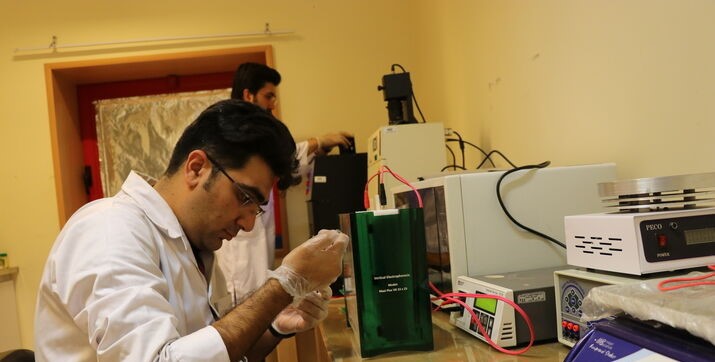

The MSc and PhD programmes in the Department of Biological Sciences are both course- and research-oriented, with research projects defined along experimental and/or theoretical lines. Faculty members are committed to conducting high-quality research and fostering international collaborations. Current research areas in the department include Folding and Stability of Proteins and Nucleic Acids; Protein Aggregation and Amyloid Formation; Enzyme Research; Antibacterial Peptides; Biological Membranes; Drug Design; Drug-DNA Interactions; Photoproteins; Recombinant Vaccines; Radiation Therapy of Cancer Cells; Stem Cells; Organoid Technology; Mathematical Modelling of Biological Processes; and Computational Biology.
My research group focuses on the molecular (biochemical) mechanisms involved in the pathogenesis of Alzheimer’s disease (AD); a devastating neurodegenerative condition, both at the national and international level. We hope that such approaches will lead to more effective—and potentially even curative—therapies. Our investigations cover several aspects of this central theme: the mechanisms of amyloid beta (Aβ) and tau aggregation (the key pathological factors in
AD initiation and progression); the development of various aggregation inhibitors (including synthetic, peptide-based, and natural products); Aβ enzymatic clearance; the relationship between type 2 diabetes and AD; the effects of reactive oxygen species (ROS) and metals in AD pathogenesis; and the impact of sleep disturbances on disease onset and progression. We use both experimental laboratory techniques and theoretical (computational and simulation-based) methods in our investigations. To date, approximately 50 MSc and 2 PhD students have graduated from this group, and currently 6 MSc and one PhD student are undertaking research projects under my supervision.
Professor Link
My recent work centres on ligand-binding studies of therapeutically and industrially significant proteins, with a focus on Hsp90 and tyrosinase, aiming to identify novel inhibitory compounds.
My research is focused on the mechanisms regulating cell fate, particularly the roles played by caspases, with the broader aim of developing novel approaches to cancer treatment. I am also actively engaged in the development of organoid and adaptive organotypic models, specifically for studying breast cancer and glioblastoma.
Professor Link
My current research is directed towards the design and development of nanoparticles based on natural polyphenols, with the aim of modulating the amyloid fibrillation of peptides and proteins implicated in neurodegenerative diseases. A major part of this work involves evaluating the ability of these nanoparticles to protect mitochondria—organelles heavily implicated in the onset and progression of such diseases—from the harmful effects of amyloid fibrils. I also investigate the therapeutic potential of these nanoparticles in mitigating toxicity induced by oxidative stress and by rotenone, using cellular and animal models of Parkinson’s disease.
Professor Link
Our research team is primarily focused on the biology of cancer, approached from multiple perspectives as part of an integrated research programme. Given the multifactorial nature of cancer—where both genetic and environmental (including lifestyle) factors contribute—our studies span cancer genetics, signalling pathways, computational biology, and multidisciplinary approaches. This integrated strategy allows us to pursue our goals from various directions, aligning with the complexity of the disease. At present, we are concentrating on gastrointestinal cancers, particularly pancreatic cancer, which is among the most lethal of the common cancers.
Professor Link
This is Mitra Pirhaghi, PhD in Biophysics. My research interests focus on studying the structure and function of proteins in health and disease conditions. In this regard, I conduct research on structural changes and the toxicity of protein aggregates in Parkinson's disease (PD). Additionally, I study functional protein aggregates in bacterial biofilms, particularly in pathogenic bacteria or those that cause damage in the food industry, and I am interested in expanding these studies. I am also committed to advancing bacterial biofilm research with a focus on its industrial applications.
Professor Link
My research focuses on four-stranded DNA structures located in the promoters of proto-oncogenes and in telomeres, which are promising targets for cancer therapy. We are investigating the effects of oxidative damage and mutation on the folding, stability, and interaction of DNA with anticancer drugs.
Professor Link
How and why some proteins prefer to interact with each other and at the same time repel other partners are interesting subjects that I would like to study using computational approaches and try to find procedures to modulate them. For more details please visit my lab page:
Professor Link
In our lab, we aim to target the DNA repair pathways of cancer cells. By suppressing these pathways, we seek to sensitise cancer cells to DNA-damaging agents, including radiotherapy and chemotherapy. We also investigate signalling pathways involved in cell invasion, with the goal of reducing the metastatic potential of cancer cells. These topics are supported by computational approaches and mathematical modelling.
Professor Link
Developed by the IASBS Computer Centre